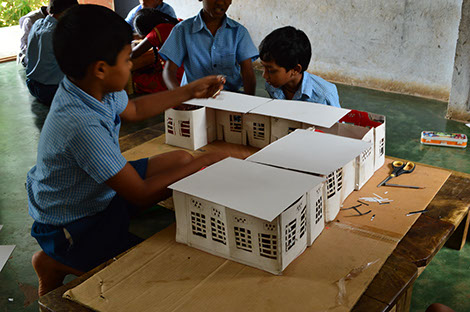Abhyasa Vidyalayam

Where learning is a Joyful Experience
The Primary School
The curriculum and the methodology are directed by the principle that the child should experience the joy of learning. The loving and lively relation between the adults and the children ensures a fear-free environment which is a essential for joyful learning. And the program is absolutely stress-free since
• The class/Home works engage them in meaningful and enjoyable activities rather than rote memorization or repeated mechanical writing.
• Backpack is very light with a single library book and a folder with one or two worksheets.
• The subjects taught are Telugu, English, Environmental Sciences and Mathematics.
• The monotony of sitting in the same room all through the day is broken by having subject-specific learning environments.
Language Environment
.jpg?crc=325771084)
Acquisition of language is considered the most important of all the skills as it is the medium through which other subjects are learnt.
The primary focus is on stimulating children’s senses through different activities so they are motivated to listen, speak, read or write. Such activities include cooking, celebrating various festivals, field trips, storytelling, movies, drama, reading books, meeting people etc.,
Book reading is considered very essential in making a child self-reliant. Plenty of books, easy access, freedom to choose, library time with-in school hours and take home facility….all encourage children to befriend books.
Mathematics Environment
The math environment is unique which takes a child into the world of numerous mathematical problems that are very close to his day to day activities. Hotel, Mini-supermarket, medical shop, math board games and many real tools like weighing machines, bathroom scales, calendars, calculates, measuring jars tapes, that are improvised and produced in school fill the cupboards of the room and provide ample scope for making math applicative and fun. Indirect focus is on mastering the four basic operational skills in mathematics.
Environmental Science

Science brings out and nurtures the innate qualities of children like curiosity, inquisitiveness , questioning and experimentation. Using science concepts in daily life to bring about behavioral change is of utmost importance. Children learn every science concept by practically experiencing it.
Upper Primary and Secondary School
Whether it is curricular or co-curricular activities, the objective is that by the time children leave the school they are well aware of themselves- their weaknesses and strengths and their interests and capabilities. The whole effort is to make them self-reliant, competent, confident, responsible and self-loving.
Languages
Language teaching focuses more on reading skills and self-expression through writing and speaking. Roll plays, dramas, discussions and debates, language games, script and poem writing are some of the activities children get involved in.
Non- Languages
Geometry in Real life
Food Fete-Applying Science
Common sense, conceptual understanding, referential skills, questioning and application are the traits children develop through Math, Science or social studies. Math through craft is a unique method that makes children imbibe some math concepts like Geometry, ratio and proportions, areas and volumes etc., unknowingly and quite naturally while doing some paper crafts. Fully equipped science lab is a place where majority of the science concepts are practically learnt apart from field observations. Discussions on history and contemporary issues and interactions with people of varied fields make learning of social studies more meaningful and interesting.